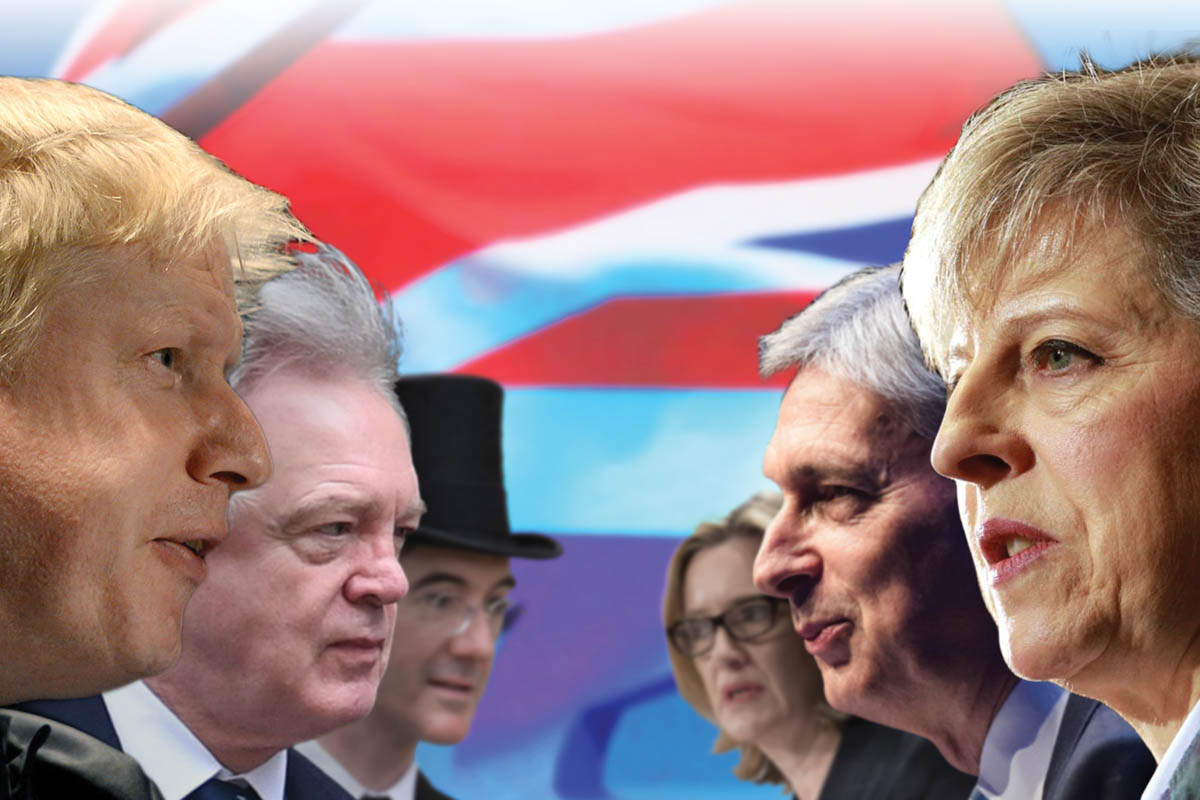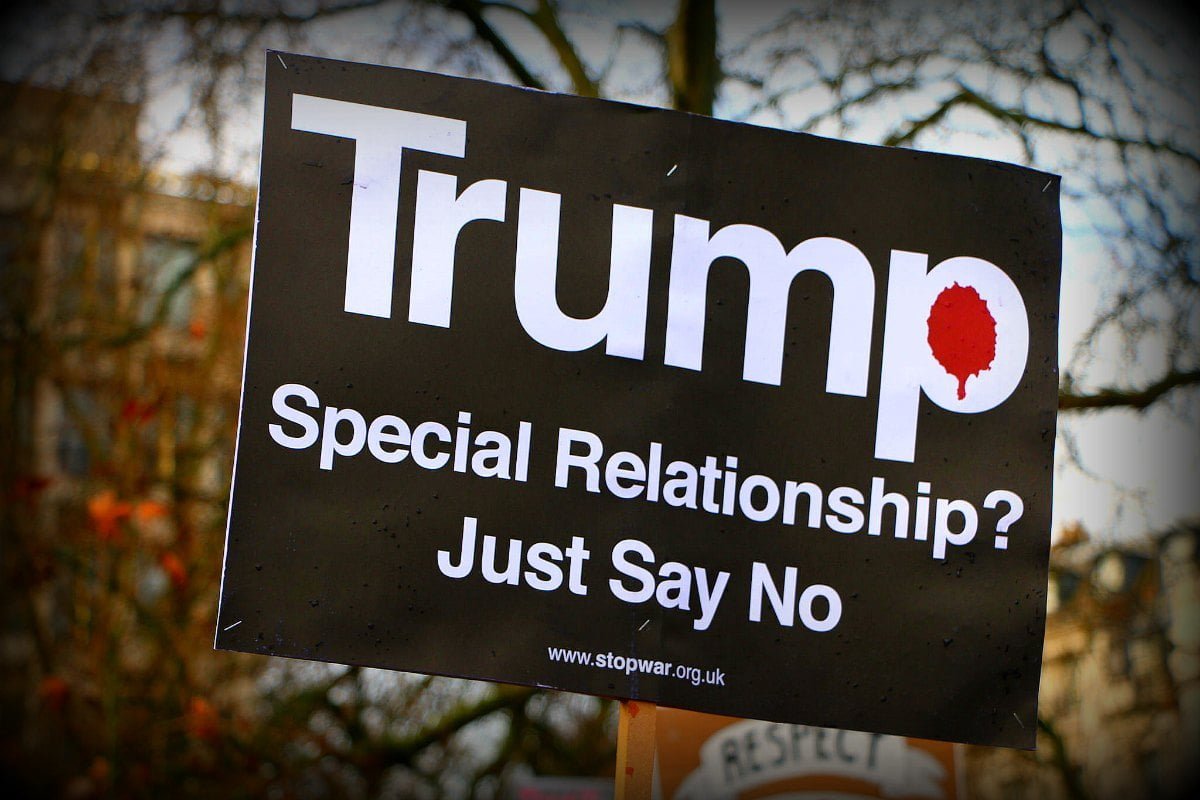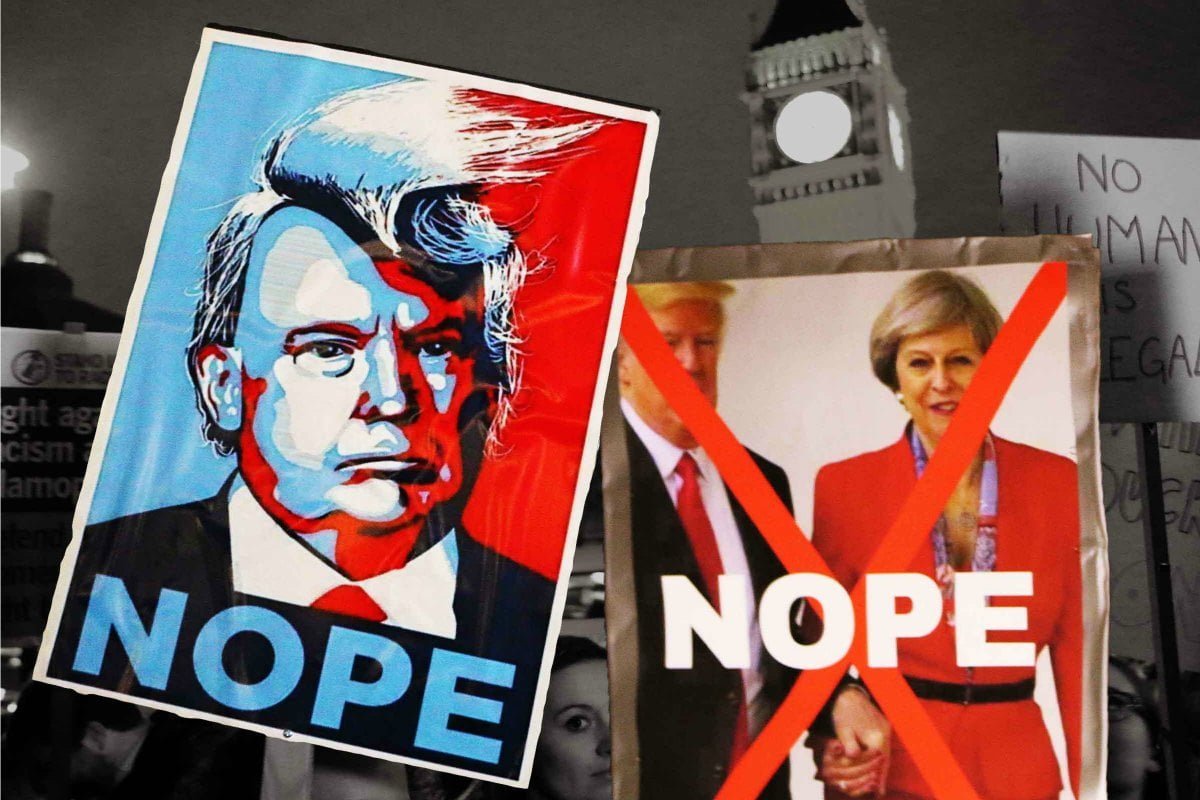At the end of last month, Donald Trump created controversy once again as a result of his trigger-happy behaviour on Twitter. The ensuing response has revealed the fragility of the ‘special relationship’ between the UK and USA, and has demonstrated the weakness of the Tories and the British Establishment in the wake of Brexit.
At the end of last month, Donald Trump – as is now tradition – created controversy once again as a result of his trigger-happy behaviour on Twitter. In yet another display of his tendency for online provocation, the maverick US President retweeted a series of videos posted by the far-right group Britain First; propaganda spewing forth the standard Islamophobic bile that is characteristic of these racist cretins.
When the inevitable backlash began, Trump naturally did not back down. Prompted about why the President had shared these videos, press secretary Sarah Huckabee-Sanders – an elegant and euphemistic wordsmith – stated that Trump had done so as an effort to highlight the need for border security.
This latest incident wasn’t just confined to the USA. Over the pond, numerous politicians and leading public figures were quick to condemn Trump and his behaviour.
Diane Abbott, the Labour MP and shadow home secretary, stated that Trump’s actions were “offensive not just to British people of Muslim heritage and British people of black and minority ethnic heritage, but to all decent British people”. Meanwhile, Brendan Cox, the husband to Jo Cox (who was murdered by a fascist with links to Britain First), said that by sharing this content, Trump was legitimising hate. Cox stated that Trump’s tacit support for xenophobic groups like Britain First represented a “new low”.
Elsewhere, many have also questioned whether Trump himself should be allowed to visit the UK.
Pathetic condemnation
Numerous calls immediately rang out for a condemnation from our commander in chief. Jeremy Corbyn, the Labour leader, for example, commented that: “I hope our government will condemn far-right retweets by Donald Trump. They are abhorrent, dangerous and a threat to our society.”
The response that eventually came from Theresa May was meek, to put it lightly. During a press conference in Baghdad, May stated that Trump’s retweets of fascists group were “the wrong thing to do”.
This condemnation, however, as pathetic as it was, didn’t go unnoticed by The Donald. He took to Twitter to tell May: “don’t focus on me, focus on the destructive Radical Islamic Terrorism that is taking place within the United Kingdom. We are doing just fine!” A rather abrasive response from a man who only months ago was holding hands with the British Prime Minister outside of the White House!
.@Theresa_May, don’t focus on me, focus on the destructive Radical Islamic Terrorism that is taking place within the United Kingdom. We are doing just fine!
— Donald J. Trump (@realDonaldTrump) November 30, 2017
When prompted by a journalist about whether she believed Trump was an enabler of far-right groups, Theresa May naturally dodged the question and talked generally about how such organisations should be condemned.
A spokesman for the government, when asked if this incident would affect Trump’s planned state visit to the UK, stated that, “the United States is one of our oldest and closest allies – an invitation for a state visit has been extended and accepted and further details will be announced in due course.”
Contradictions laid bare
 This latest back-and-forth between the US President and UK Prime Minister has exposed the many contradictions facing May and the Tories in the wake of the Brexit vote.
This latest back-and-forth between the US President and UK Prime Minister has exposed the many contradictions facing May and the Tories in the wake of the Brexit vote.
The PM and her Tory government are in a precarious situation. The previously “strong and stable” May administration has been blown apart by the results of the snap general election, called hubristically in order to kill off Corbyn’s Labour and win the Conservatives a larger majority. Instead, there was a surge of support for Corbyn and the consequential destruction of the Tories’ parliamentary majority. All that was solid has melted into air.
Theresa May is therefore now forced to balance between the two wings of her party. The tensions between the pro-Brexit and pro-EU camps within the Tories have been laid completely bare. The open civil war now raging inside the Conservative Party leaves May attempting to balance on the edge of a sword – trying to please both sides, but in the end pleasing no one.
Most importantly, the Twitter exchange between May and Trump has revealed how weak Britain is on the world stage following the Brexit vote. As a result of persistent Tory jingoism, the UK finds itself increasingly at odds with countries on the continent, who are tired of the Brexiteers’ arrogant and deluded rhetoric, particularly surrounding the EU-UK negotiations. And with no European allies to rely on, the British Establishment is left with only one major ally: the USA.
The Prime Minister’s weak condemnation of Trump is a clear reflection of the fact that she cannot risk alienating the main ally that Britain now relies upon.
The Tories’ Brexit wing are terrified of damaging the ‘special relationship’, as their whole argument for leaving the EU was based on the misguided assurance that this would allow the UK to forge stronger alliances with states such as the US in terms of trade, etc.. Any strong condemnation of the US President would naturally put this prospect at risk.
At the same time, the President’s ‘America First’ policy and volatile behaviour (such as the recent recognition of Jerusalem as the capital of Israel) makes it increasingly difficult for May and her government to remain silent in relations to Trump’s erratic actions. The recent confrontation between the UK and US administrations over Bombardier jobs and tariffs also highlighted this contradiction facing May and the British ruling class.
British imperialism’s decline
 Trump’s response in this situation is even more indicative of Britain’s diminished position internationally. British capitalism has been in a steady state of decline for over a century. British imperialism, in turn, has been reduced to being a second- or third-rate power. This process has been accelerated in the recent period by the threat of Brexit to investment and trade.
Trump’s response in this situation is even more indicative of Britain’s diminished position internationally. British capitalism has been in a steady state of decline for over a century. British imperialism, in turn, has been reduced to being a second- or third-rate power. This process has been accelerated in the recent period by the threat of Brexit to investment and trade.
The US consequently is not particularly interested in making much effort to maintain the so-called ‘special relationship’. Britain may have been a useful poodle for US imperialism at one point in time. But now – following the debacle of Afghanistan and Iraq – the role that the UK can play in Western imperialism’s adventures has been greatly impaired. The British Establishment’s constant emphasis on how the US is one of Britain’s “oldest and closest allies” is a clear sign of their desperation and weakness.
On the other side, the mass outrage towards Trump from the British public has essentially forced Theresa May’s hand. Stuck between the choice of condemning Trump and risking the ‘special relationship’, or not condemning Trump and consequently angering both the public and MPs within her own party, the Prime Minister had no choice but to offer a confused statement in the most tepid of language.
Stop Trump! Kick out the Tories!
The scene is now set for even greater expressions of mass anger – this time on the streets. Protests called in response to speculation of a Trump state visit to Britain at the end of February have already gathered enormous momentum. Demonstrations planned for across the country could prove to be the biggest seen since the time of the second Iraq war in 2003. Similar protests against Trump and his #MuslimBan earlier this year highlighted this potential, with 50,000 turning out in London on a cold Monday evening at 24-hours’ notice, and thousands more assembling in other cities and towns.
Such protests will prove to be yet another thorn in the side for the Prime Minister and her enfeebled government, which is already facing a plethora of scandals and crises. Fighting another battle – alongside the ongoing wars already raging over the Brexit negotiations and the stagnant British economy – could be the final straw for May and the Tories.
At the same time, these demonstrations provide a golden opportunity for Corbyn and the labour movement to go on the offensive: to highlight the hypocrisy of the Tories; to deal a deadly blow against this weak and wobbly Conservative government; and to fight for a socialist alternative to austerity, racism, and imperialism.






